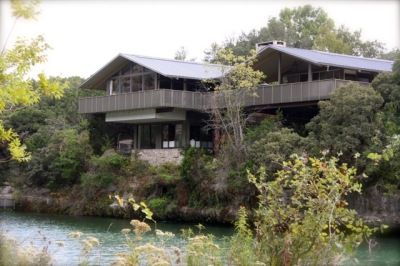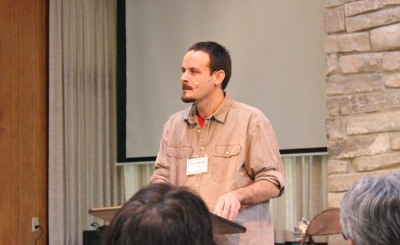“The full glory of the hokey pokey is to put your whole self in.”
—Charlie Peacock
My room is a mess, and I’m not just saying that.
First, there is “the pile” — a heap of clean laundry on top of an old blanket my mom made for me when I was ten; underneath is my soon-to-be discarded printer. My twin-size bed is covered with a bedspread, purchased from the thrift store, that yowls a horrendous (I mean, “vintage”) floral design. One wall bears the weight of a large abstract likeness of Van Gogh, a project from my older sister’s undergrad art degree. Another wall serves as a bulletin board to hold articles, notes, miscellaneous projects, mementos, and a TOMS flag. The laminate-covered particle board of my desk, a cheap purchase from Office Depot, boasts a stack of books on writing along with an assortment of CDs, notecards, and a lighter I keep handy for the occasional candle-lighting. There’s also a migrant scattering of pens complemented by more stacks of books and papers on the verge of some strange organization.
Ah, this room in all its disastrous but candlelit glory! This is where I sleep, do homework, read, and write. Many a meal has been snarfed in this room. And I left it all behind for four days in Leakey (that’s “lay-kee,” not “lee-kee”), Texas. Escape!
 Photo: Barbara LaneEarly on a Thursday morning two weeks ago, I gathered my bags and hit the road for Laity Lodge's annual artist retreat, including Art House America founders and friends. Eight hours and a triple-shot latte later, I turned off Highway 83 and eased the car down a gravel road. Hand-carved signs punctuated the progression of slopes and curves leading down into the canyon, asking me to slow down. At the bottom of the canyon, the road disappeared into a river. I stopped to double-check the driving directions. “Turn left into the river . . . ” Well, why not? I rolled down the windows and let the car splash gently into the water. I reached for my cell phone, eager to share the moment with a friend, only to find I’d lost cell service during my descent into the canyon.
Photo: Barbara LaneEarly on a Thursday morning two weeks ago, I gathered my bags and hit the road for Laity Lodge's annual artist retreat, including Art House America founders and friends. Eight hours and a triple-shot latte later, I turned off Highway 83 and eased the car down a gravel road. Hand-carved signs punctuated the progression of slopes and curves leading down into the canyon, asking me to slow down. At the bottom of the canyon, the road disappeared into a river. I stopped to double-check the driving directions. “Turn left into the river . . . ” Well, why not? I rolled down the windows and let the car splash gently into the water. I reached for my cell phone, eager to share the moment with a friend, only to find I’d lost cell service during my descent into the canyon.
Through the river, up a hill, into the parking lot: I pulled my keys from the ignition and climbed out of the car to stretch my legs and find the registration office. The grounds were beautiful, green and shady with plenty of benches and swings conducive to creative reveries. I was directed hospitably to the office where the hostesses greeted me warmly and handed me a name tag. Pleasant conversation ensued as I waited for someone to offer whatever else I’d need for the weekend — namely, a room key and retreat schedule. What can I say? Privacy and structure are major fixtures in my life. Maybe I didn’t realize how major until I left the office to head in the general direction of my room with neither key nor schedule. An odd feeling.
In the dailiness of life, it’s easy to settle for putting just one hand or foot in for a good “shake-it-all-about,” or to not play at all. When Charlie invited us, during his opening talk, to consider the “full glory of the hokey pokey,” desire welled up in my chest. A recollection of an itch to dance, make music, travel, and keep a home.
Charlie went on to make the distinction between being “creative” and living with imagination. “Creativity” is a word that perhaps has grown tired with use and doesn’t fully capture what it means to “put your whole self in.” Imagination precedes creativity. It’s the dynamic force behind all acts of genuine creativity. The goal is not always to create stuff, but to remain on the growing edges of an always-imaginative life. Imagination pierces through the fog that envelops the routines and to-do lists of ordinary life. By living with imagination, one's ordinary life is changed for the better, offering you the freedom to “put your whole self in.” This freedom isn’t an automatic or spontaneous gift bestowed on those recipients who seem to magically have all the time, energy, money, and requisite “coolness” to live creative lives (or even just keep a clean bedroom). The freedom to dance the full glory of the hokey pokey, to live with imagination, comes as choices are made.
Several times during the course of the retreat, Charlie and Andi mentioned a conversation and prayer they shared during a previous visit to Laity Lodge: “More of this, less of that.” My escape from the chaos at home, a drive through the river, an essentially useless cell phone, the unlocked doors and elusive schedule — something in my arrival at Laity Lodge gave me a taste of “less of that.” I want less chaos, less hurry, less technological distraction, less insulation and isolation, and less of the mechanical mental state that dominates the dailiness of life. But what about the “more of this”?
 Photo: Barbara LaneLaity Lodge gave expression to the “more of this” that I desire. It’s a place to slow down and be free of an imposing schedule. Without cell service, there’s a natural limitation to the distraction of connectivity. Even though wireless internet was available, we were encouraged to help keep the public spaces dedicated to being with others face-to-face. The environment warms its inhabitants with a desire for community and offers places where friendships can be kindled in conversation and music, recreation and rest. The fireplace was a nook where staying up past bedtime was honored, cultivating friendship through conversation and song.
Photo: Barbara LaneLaity Lodge gave expression to the “more of this” that I desire. It’s a place to slow down and be free of an imposing schedule. Without cell service, there’s a natural limitation to the distraction of connectivity. Even though wireless internet was available, we were encouraged to help keep the public spaces dedicated to being with others face-to-face. The environment warms its inhabitants with a desire for community and offers places where friendships can be kindled in conversation and music, recreation and rest. The fireplace was a nook where staying up past bedtime was honored, cultivating friendship through conversation and song.
And the food, oh the food. A well-prepared, well-served meal creates space in the day for nourishment, not just food, and conversation, not just talk. Pure sacredness. I want “more of this” kind of living. More silence and rest, more face-to-face interaction, more care given to the preparation and presentation of food, more table conversation, more late nights sharing beside a fire.
In discussion with Charlie during one session, Steven Garber, whose thoughts have been deeply shaped by the L’Abri movement, presented the challenge of “being human . . . to the glory of God and the good of my neighbor.” The “more of this” I desire is also a life that adds to our world's beauty by making things, nurturing relationships in community, and offering others — and even myself — the hospitality and freedom to live a fully human life.
 Photo: Bill BuchananOn another occasion, Gideon Strauss spoke about the “greatness of small things” and living with “daily imagination.” In brief meditations on works like Vermeer’s painting The Milk Maid and Muriel Barbery’s book The Elegance of the Hedgehog, he drew me into a fresh revelation of the sacredness of the ordinary. Gideon insisted that the way we dress ourselves, keep our homes, and pour milk over our morning cereal can each be acts of imagination and generous contributions to beauty in the world. Not long after, he asked us to break into small groups to share stories about the places in our lives where we live with imagination. With a red-faced gulp, I remembered my room — that place of unkempt belongings an unfinished projects, the embodiment of my harried schedule. I burned through my last candle about a month ago and haven’t taken the time to find a fresh one to light.
Photo: Bill BuchananOn another occasion, Gideon Strauss spoke about the “greatness of small things” and living with “daily imagination.” In brief meditations on works like Vermeer’s painting The Milk Maid and Muriel Barbery’s book The Elegance of the Hedgehog, he drew me into a fresh revelation of the sacredness of the ordinary. Gideon insisted that the way we dress ourselves, keep our homes, and pour milk over our morning cereal can each be acts of imagination and generous contributions to beauty in the world. Not long after, he asked us to break into small groups to share stories about the places in our lives where we live with imagination. With a red-faced gulp, I remembered my room — that place of unkempt belongings an unfinished projects, the embodiment of my harried schedule. I burned through my last candle about a month ago and haven’t taken the time to find a fresh one to light.
In Art and the Bible, Francis Schaeffer wrote, “He may have no gift of writing, no gift of composing or singing, but each man has the gift of creativity in terms of the way he lives his life. In this sense, the Christian’s life is to be an art work . . . a thing of truth and also a thing of beauty in the midst of a lost and despairing world.” Justice and beauty become entwined as we do everyday things with imagination.
The example Gideon gave of this union was profoundly practical: buying eggs. When we buy our eggs from businesses that allow their chickens to live a “chickeny life,” we make a choice toward a more just and beautiful world in which chickens are free to be just chickens. This is something within reach for ordinary folks with limited time, energy, money, and “coolness.” I too can live with imagination even as I buy eggs. We can live with imagination even as we dress ourselves and arrange our furniture. We can live with imagination as we prepare a meal. We can invite others into our lives and attend their stories, share our lives in such a way that allows them to live a more human life. We can light a candle to shed some tiny flicker of beauty on the chaos of a poorly-tended bedroom. We can make daily choices to live with “more of this” and “less of that.” This is where the work of dancing the full glory of the hokey pokey begins.
 Photo: Barbara LaneAfter hearing the closing remarks on Sunday morning, taking the Eucharist with newfound friends, and enjoying a delicious brunch, I said goodbye. It’s a witness to the restoration and community fostered throughout that retreat that as I drove up Highway 83 toward the Interstate, I wept. Andrew Osenga’s “Staring Out a Window” poured through my car speakers, and I broke down and bawled like a baby. Leaving was hard. Reentry was harder.
Photo: Barbara LaneAfter hearing the closing remarks on Sunday morning, taking the Eucharist with newfound friends, and enjoying a delicious brunch, I said goodbye. It’s a witness to the restoration and community fostered throughout that retreat that as I drove up Highway 83 toward the Interstate, I wept. Andrew Osenga’s “Staring Out a Window” poured through my car speakers, and I broke down and bawled like a baby. Leaving was hard. Reentry was harder.
I arrived home on Monday morning, parked the car in my usual spot, gathered a manageable armload of stuff, and walked up the stone path to the front door. A sigh escaped my lips. I knew what was waiting for me inside — my room, with its piles and scatterings, the stacks of books, and everything else. I stepped into the room, set my belongings on the loud bedspread, and peered at the mess through road-weary eyes.
Coming back into the dailiness of life after a time immersed in great thought, art, music, conversation, community, and all-around beauty is an odd transition. Not because of how easy it is to forget what it’s like to live as myself in the context of “normal life,” but because after four days of living the “more of this,” my way of looking at life was permanently altered. The dailiness of life seems less mechanized and rote, and more malleable with a capacity to bear the glorious weight of burgeoning imagination.
Barbara Lane is an editorial intern for the Art House America Blog, a graduate student, and a companion to Sir Gibbie, her parrot. She blogs at This | Liminality and is learning to live with imagination.















